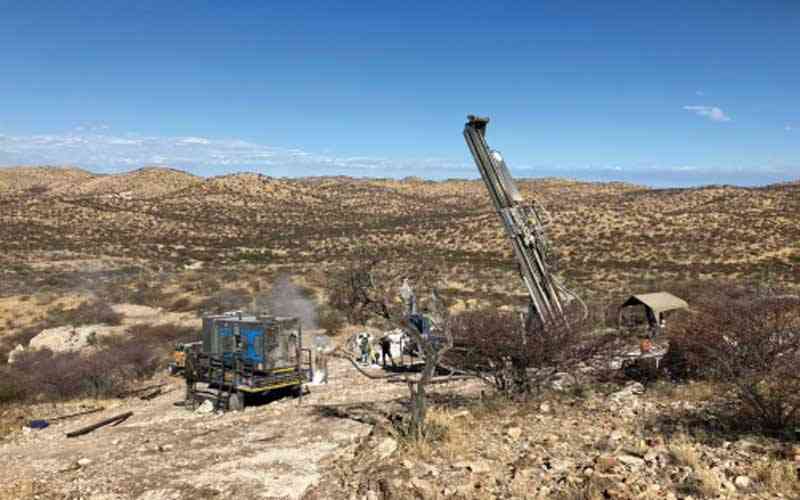Invictus closer to final oil, gas sharing agreement with Govt
INVICTUS Energy, the Australian firm that discovered gas deposits north of Zimbabwe last year, is nearing completion of a petroleum production sharing agreement (PPSA) with the Government, which will guarantee the State getting a 40 percent share of the hydrocarbons extracted.
Late last year, the company announced an additional gas discovery in both the upper and lower Angwa geological formations of the firm’s licence area, marking a significant milestone for Invictus.
The Mukuyu-2 discoveries were drilled 7 kilometres away and 450 metres up-dip of the Mukuyu-1, which was also declared a discovery, confirming the incredible potential of the Mukuyu-1 and 2 fields, in Mbire District, Mashonaland Central Province.
The company also holds permit for blocks in Muzarabani, a few kilometres from the current sites of the condensate gas, form of light oil, discoveries.
Mukuyu-1, Invictus basin opening well, encountered technical challenges that prevented the recovery of oil/gas samples as required by regulatory authorities in Australia.
It was, however, eventually declared a successful discovery after Mukuyu-2 on account of striking technical details from the evaluation of both sets of data from the exploration wells.
Invictus said the discoveries provided the company with substantial running room for identifying further potential discoveries within its 360,000-hectare acreage in the Cabora Bassa Basin.
Following the discoveries the company said it would begin preparing for a new round of activities including well tests at Mukuyu-2 and further drilling of appraisal wells and/or new exploration prospects across its prospective portfolio.
Managing director, Scott MacMillan, said negotiations to finalise the agreement had picked up pace since the Government appointed an executive for Mutapa Investment Fund (MIF), the license partner in the Cabora Bassa project.
Former Reserve Bank of Zimbabwe (RBZ) governor, Dr John Mangudya, was appointed chief executive officer of Mutapa Investment Fund in May this year, after the lapse of his second term as the central bank supremo.
MacMillan said the PPSA would ensure the Government got a share of the resources to cater for its citizens while the agreement also secured the company’s long-term interests.
Briefing shareholders recently on the developments at the company during the first half of the year, MacMillan said the PPSA also allowed the company to get a good return on its investment.
Zimbabwe, he said, had one of the most attractive fiscal and petroleum legislations in the world, similar to South Africa and Namibia in the region, which he noted ranked in the upper quartile globally.
“The PPSA is the petroleum production sharing agreement and this is the final piece of legislation that is not required but desired by the company that will provide us with a long-term fiscal and legal agreement to govern the project for the next few decades.
“The PPSA has been in progress for a long time, I think everyone is aware of that; it is a very key agreement. Typically, these are signed ahead of when you begin to explore.
“However, we have all the (petroleum) legislation in place already in Zimbabwe because it is operating on a royalty tax regime, which is the Mines and Minerals Act.
“So, the PPSA has been introduced to provide the country with a fair share of its resources.
“Zimbabwe currently has the best fiscal regime for oil and gas in the world; just 2 percent royalty on gas and corporate tax; that is not a fair split of the proceeds by any stretch of the imagination.
“We sought to introduce the PPSA to fulfil a few objectives. Primarily, it’s about being able to provide the country with a fair share of their resources, but the main thing in which we do that; not just through royalty and tax, but through production sharing agreement which allows the country and its citizens to benefit not only from profits but the product,” he
said.
Further, the PPSA will allow Zimbabweans to enjoy subsidised power and fuel.
Zimbabwe is already mineral-rich, with more than 60 extractable minerals, although less than 10 percent are commercially exploited. Notably, more than 75 percent of its exports come from the extractive sector.
The MIF, the sovereign wealth fund established by the Government to promote investment in the country, is a 10 percent partner in the oil and gas project.
The fund will be entitled to the Government 40 percent share of the production from the project.
Non-fiscal benefits for Invictus, MacMillan said, included access to investor funding for project development, as the PPSA provided lenders with the assurance that the rules will not change.
“This is a long-term investment that is going to enable them to see us, again, being able to meet a specific rate of return and that risks are suitably addressed through this,” MacMillan said.
He said several companies were already operating in Zimbabwe’s petroleum sector (coal bed methane), including one that already had a production licence and had not issues in this respect.
MacMillan said while the country had provisions on how it should benefit from its petroleum resources, this was not commensurate with the rest of the region and like South Africa and Namibia, which are closer to Zimbabwe and are at the same stages of developing their assets, hence the PPSA.
“In terms of its progress, the fiscal terms (of the PPSA) have been agreed upon, there is some minor implementation of things that are going on at the moment.
“We have got the Mutapa Investment Fund who are now spearheading the progress of the PPSA.
“The reason that it has taken longer than we had hoped is because the Mutapa Investment Fund had not been capacitated until very recently so it did have a board and it did not have an executive.
“That (gap) has now been filled with former Reserve Bank of Zimbabwe Governor (John Mangudya) taking over as CEO of MIF, as of MIF,” he said.
Following this, Invictus had a meeting with Dr Mangudya and his team to expedite the finalisation process. Invictus also has a team of legal experts on the ground to make sure its interests are well covered.
MacMillan said Mutapa Investment Fund, being a 10 percent back-in rights partner in the project, and entitled to the Government’s 40 percent share of production, had a vested interest and would therefore push to finalise the PSSA, as directed by the Government.
The Mukuyu field was last year identified as the second-largest discovery in Sub-Saharan Africa in an upstream review published by global energy research firm Wood Mackenzie last year. Mukuyu is considered to hold an estimated 230 million barrels of oil equivalent (boe) (1,3 trillion cubic feet) resource.
Wood Mackenzie’s review noted that regional exploration yielded seven discoveries from a total of 17 wells drilled across the sub-continent in 2023, with Invictus accounting for two of the discoveries.
These include Shell’s Jonker-1 and Lesedi 1X in Namibia, Invictus Energy’s Mukuyu-2 in Zimbabwe, TotalEnergies Ntokon 1AX in Nigeria, Azule Energy’s Lumpembe in Angola, Sasol’s Bonito 1 in Mozambique and BW Energy’s DHBSM1 in Gabon.
Potential game-changing benefits for Zimbabwe include faster economic growth, increased export earnings, energy security for a country facing a crippling electricity deficit, massive job creation, and the development of completely new downstream industries.
Condensate gases are also used for power generation, and manufacture of products such as petrol (gasoline), jet fuel, diesel and heating fuels.
Some condensate gases, particularly those with a high paraffin content, are used for the manufacture of ethylene (feedstock for polymers and industrial chemicals).-ebsuinesswekly










